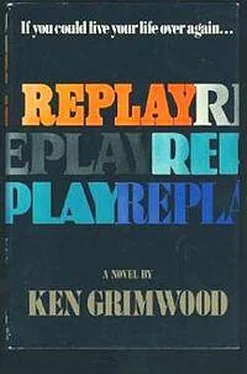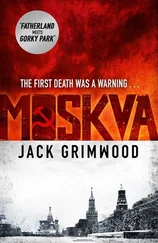What would become of that drastically altered world now, Jeff wondered, if it continued on its own divergent time line, followed the course he and Pamela had, with all good intentions, inadvertently set for it? A state of martial law had existed in the United States for three years already, in the aftermath of the November Squad’s destruction of the Golden Gate Bridge and the massacre at the United Nations Building. The 1988 presidential election had been indefinitely postponed because of the newly imposed restrictions on large public gatherings, and the heads of the three major intelligence agencies were effectively in control of the country "for the duration of the emergency."
It had seemed likely that a fascist American state was in the making, which of course had been the goal of the international terrorist underground from the beginning. Its members had wanted nothing more than to bring on a genuinely oppressive regime in the United States, one that even ordinary citizens might consider fighting to overthrow. Unless, of course, the militantly anticommunist CIA/NSA/FBI troika that ran the interim government first decided to bring on the worldwide nuclear conflict that had been threatening to erupt since the late seventies.
Linda stood with her naked silken back against the cool rush of air, her eyes closed and one hand holding her hair high on her head to expose her slender neck to the soothing flow. The shafts of light from the blinds showed the stretch of her dancer’s legs through the sun-sheer white dress.
Pamela had been right to turn on him, Jeff thought with anguish; right to denounce them both for what they’d set in motion, however unwittingly or altruistically. In making themselves known to the world and in dealing with the government in exchange for the paltry information they had received, they had sown the seeds of a vicious whirlwind that some other world must now reap. It remained to be seen whether she—or either of them, for that matter—would ever be able to forgive themselves for the brutal global violence they had wrought in the name of benevolence and understanding … And it would be years, perhaps a decade or more, before he would even have the opportunity to try to talk to her again, to attempt some reconciliation of their personal estrangement and to come to terms with the tragic totality of their failure to improve mankind’s lot. That world was lost, as surely as Pamela was now lost to him for unknown years to come, perhaps forever.
"Tickle me," Linda said in her sweet, clear voice, and for a moment Jeff didn’t know what she meant. Then he remembered the delicate touch she once had relished, the slow, gentle trailing of his fingertips across her skin, so lightly it was almost not a touch at all. He took a daisy from the bunch that she had given him, used its feathery petals to trace an imaginary line from her ear along her neck and shoulder, down her right arm, and then back up her left.
"Ooh, so good," she whispered. "Here, do it here." She loosened the thin shoulder straps of her dress, let it fall away from her youthful breasts. Jeff caressed her with the flower, bent to kiss each nipple as it came erect. "Oh, I love that." Linda sighed. "I love you!"
And on this perfect, twice-lived day he took his needed solace in the unquestioning passion and affection of this woman with whom those feelings had been so long denied. In her love for him, his refound love for her, he lived again.
The citrine streaks in Linda’s hair had been lightened to an even paler yellow by the days in the Moroccan sun, making it seem as if her hair were reflecting the imagined light from the great gold sunburst tapestry behind the lengthy bar. She clutched at the bar’s railing, laughing, as the ship rolled gently in the North Atlantic swells. Her gin and tonic began to slide across the tilting oaken surface, and she caught it with a deft move, the ice in the glass tinkling with her laughter.
"Encore, madame?" the bartender asked.
Linda turned to Jeff. "Do you want another drink?"
He shook his head, finished his Jack Daniel’s and soda. "Why don’t we take a walk out on the deck? It’s a warm night; I’d like to look at the ocean." He signed the bar tab with their cabin number, handed it to the bartender. "Merci, Raymond; à demain."
"À demain, monsieur; merci."
Jeff took Linda’s arm, and they walked through the slightly swaying Riviera Bar and out onto the Veranda Deck. The striking red-and-black smokestacks of the S.S. France jutted above them into the night sky, their sleek horizontal fins like the immobile flippers of two gigantic whales frozen in mid-leap. The great ship rose into an oncoming swell, dipped smoothly into the trough between the immense but steady waves. The stars above were unobscured by clouds, but far to the south a line of thunderheads lit the horizon with constant bursts of lightning. The storm was moving this way, though at thirty knots they’d be clear of the tempest before its violent winds and pelting rain reached this stretch of ocean.
Heyerdahl, Jeff thought, wouldn’t have the luxury of escaping such a random fury; he’d see the coming storm with different eyes, wary and concerned at the tiller of his little papyrus boat, so far from land. It was just such a storm that had stopped him last year, forced him to abandon his damaged craft in heavy seas, six hundred miles short of his goal.
"Do you really think he’ll make it this time?" Linda asked, staring at the jaggedly illumined clouds in the distance. She’d been thinking the same thing, wondering about the fate of the affable bearded Norwegian with whom they’d shared the labors and accomplishments of the past three weeks in the ancient fortressed port of San, where he’d built—and had last week launched—his historic, purposefully primitive little boat.
"He’ll make it," Jeff said with assurance.
Linda’s filmy dress fluttered in the wind from the approaching storm, and she held tightly to the ship’s railing. "Why does he fascinate you so?" she wanted to know.
"For the same reason Michael Collins and Richard Gordon fascinate me," he told her. And Roosa, he could have added, and Worden and Mattingly and Evans, and the POWs who’d start returning three years from now, in 1973. "The isolation, the utter apartness from the rest of humanity…"
"But Heyerdahl has a seven-man crew with him," she pointed out. "Collins and Gordon were completely alone in those capsules, for a while, anyway."
"Sometimes isolation can be shared," Jeff said, looking at the billowing ocean. The warm smell of the oncoming tropical disturbance made him think of the Mediterranean, of a day when that same scent had drifted through the open window of a villa in Majorca. The peppery savor of paella, the lacerating wistfulness of Laurindo Almeida’s guitar, the mingled joy and grief in Pamela’s eyes, her dying eyes.
Linda saw the shadow that had crossed Jeff’s face, and she moved her hand to his, gripped it as firmly as she had the ship’s railing. "I worry about you sometimes," she said. "All this talk about loneliness and isolation … I don’t know if this project is such a good idea. It seems like it’s getting you too depressed."
He pulled her to him, kissed the top of her head. "No," he reassured her with a smile full of affection, "it’s not depressing me. Just making me thoughtful, that’s all."
But that wasn’t entirely true, he knew; his meditative state had brought about the undertaking that obsessed him now, not the reverse. Linda’s presence, her unaccustomed loving openness, had calmed his battered senses since that day in August 1968 when he had resumed this life to find her waiting at his door with an armful of fresh-cut daisies. But not even the unexpected rebirth of all they’d shared so long ago had been enough to make him forget the torments he had indirectly inflicted on the world through Russell Hedges in that previous life, or the estrangement all of that had forced between him and Pamela. Guilt and remorse were inescapable; they formed an unremitting undercurrent that seemed to constantly erode the foundations of his resurrected love for the woman he once had married. And that ongoing diminution led to new modes of remorse, a present guilt made all the worse by his conviction that he should be able to change his feelings, let go the past and give himself as fully to Linda as she now did to him.
Читать дальше












